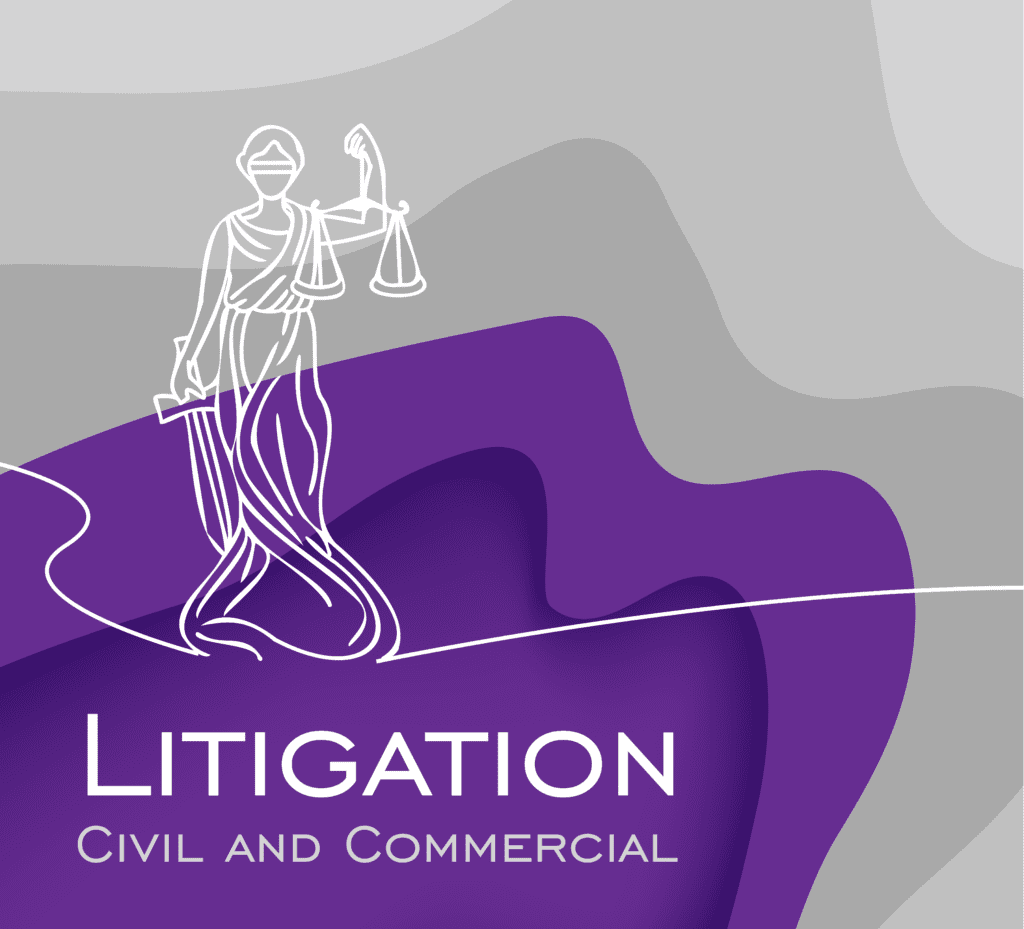At Aristone Solicitors, our litigation and dispute lawyers have extensive experience representing high-profile clients across the UK. Our expertise extends to all types of complex, sensitive, and time-critical disputes spanning a broad range of key sectors, including technology, healthcare, finance, infrastructure, energy, transport, life sciences, and more.
Our team works hard to both prevent and resolve disputes as efficiently as possible, providing clients from all backgrounds with 100% bespoke legal support and representation of the highest quality. The services we provide always prioritise the strategic and commercial objectives of those we support. From obligation-free initial advice to formal negotiations to mediation and arbitration, we always aim to settle disputes without expensive court involvement. Aristone Solicitors also understands the importance of managing risk and maintaining positive public relations, where dispute resolution is concerned.
Aristone Solicitors: Areas of Expertise
Just a few of our main areas of expertise within the context of litigation and disputes include the following:
- Fraud and asset recovery
- Energy and infrastructure
- Environmental law
- Employment and labour
- Class actions
- Bankruptcy and insolvency
- Banking and financial disputes
- Antitrust and competition
- Public and administrative law
- Professional negligence
- Intellectual property
- Alternative dispute resolution
- Mining
- Shareholder disputes and activism
- White collar crime
- Transportation
- Regulation and investigations
- Compliance
- International arbitration
- Information governments
- Construction and engineering
- Retail and consume
We welcome clients from all backgrounds, and our team has collective capabilities in a number of global languages – including Punjabi, Urdu, Hindi, Russian, Georgian and Kurdish.
For more information on any of the above or to discuss any aspect of your case in more detail, contact a member of the team at Aristone Solicitors today.
Executry Probate Solicitors England
When a loved one passes away, knowing where to start with what is left behind can be difficult. Dealing with one of life’s biggest challenges can be further complicated by the burden of ensuring their assets are fairly and legally distributed.
At Aristone Solicitors, we specialise in friendly, personable, and empathetic legal support for individuals and families during difficult times. With fixed- price probate packages available starting from as little as £1,500 (plus VAT), we can make it easy and affordable to deal with the complications of executory probate in England.
For more information on any of the above or to discuss the services we provide in more detail, contact a member of the team at Aristone Solicitors.
What is Probate?
The term ‘probate’ refers to a court-issued document, which enables appointed executors to legally distribute the assets of a deceased individual. ‘Probate’ is the most commonly used term in England and Wales, whereas the Scottish legal system uses ‘confirmation’ in reference to the same thing.
Irrespective of where the process takes place, the basic steps involved in winding up a deceased individual’s estate remain the same:
Inventory. The process of formally identifying the deceased individual’s assets, and creating a detailed inventory of their estate.
Confirmation. Formal confirmation of the death of the deceased individual, and the release of their assets.
Paying off any debts. This includes any outstanding loans or mortgages, and any inheritance tax payments that need to be made.
Passing on inheritance to the beneficiaries. Final transfer of the assets and estate to the deceased party’s beneficiaries.
At Aristone Solicitors, our approachable and experienced solicitors can help you negotiate the complexities of probate in a smooth, simple, and sensitive way, ensuring a prompt outcome with as few complications as possible.
Whether you are ready to go ahead or simply considering your available options, we would be delighted to hear from you anytime. Call today for an obligation-free consultation with a member of our team.
Fixed Fee Grant of Confirmation/Grant of Probate Service
Our probate/confirmation services in England are available as a fixed-fee package, which for as little as £1,500 comprises the following:
- Identification and executors and administrators
- Obtaining and verifying copies of the deceased’s will
- Application for grant of probate/confirmation
- Completion of tax forms and all associated paperwork
- Submission of applications on our clients’ behalf
- Simplification of all complex legal terminology
- Full assistance with any disputes that may arise
All of the probate/confirmation services we provide are tailored to meet the unique requirements of every client we support. However complex or time-critical your case may be, our team is standing by with the support you need – call today to learn more.
Flexible Estate Administration Service
As an alternative to our fixed-fee grant of confirmation/probate service, our team can also take care of administering your loved one’s estate in full. Our end-to-end solutions are built from scratch around the client’s needs, and costs are calculated in accordance with the extent of the support required.
Following an initial consultation to discuss the specifics of your case, we will provide you with a full and transparent estimate of total costs and fees. You will also be provided with a full report to verify that the costs of your case are a fair and true representation of the level of support provided.
If you would like to learn more about our end-to-end estate administration services in England or anywhere else in the UK, call the team at Aristone Solicitors anytime.
Other Services from Aristone Solicitors
Our skilled probate solicitors have extensive experience in a broad range of related legal matters, including but not limited to the following:
Wills. Aristone Solicitors can provide the support you need to prepare your final will and testament in complete confidence, and leave behind a clear and legally binding document.
Will updates. Should it become necessary to update your will once it has been formalised, we can guide you through the process, and verify the legitimacy of your amendments.
Trust corporation. Contact a member of the team at Aristone Solicitors anytime to learn more about trust corporation.
Wills with discretion. A discretionary will empowers executors to distribute assets according to circumstances at the time of the deceased person’s death, rather than those at the time they wrote their will.
Call anytime to learn more about the above, or email Aristone Solicitors at your convenience and we will get back to you as promptly as possible.
Executory Probate in England FAQs
What is executory (probate)?
The term ‘probate’ refers to the document issued by the courts as confirmation of appointment of executors, who receive the right to distribute a deceased part’s assets (aka administer their estate). While the document is referred to as ‘probate’ in England and Wales, it is more commonly called ‘confirmation’ in England.
What are the duties of executors in England?
Executors in England play a lead role in allocating and distributing the assets left behind by a deceased individual. Cases vary significantly in complexity, in accordance with the size and nature of the estate left behind. Typical duties performed by an executor in England include the following among others:
- Applying for probate/confirmation on behalf of those they represent
- Managing and securing the deceased’s assets prior to distribution
- Comprising a full inventory of the assets/estate left behind
- Ensuring all debts are paid off and tax obligations are fulfilled
- Distributing assets in accordance with the deceased party’s will
- Distributing assets in accordance with English law if there is no will
In addition to the above, the executor takes responsibility for any mistakes made in the management of the distribution of the estate. Full and detailed correspondence and transactional records must therefore be kept, and made available to the clients they support on demand.
When do an executor’s duties end?
The duties of the executor come to an end once all assets left behind by the deceased individual have been distributed, and the beneficiaries are satisfied with the outcome. At this point, the account of the executor will be closed, and their responsibilities come to an end.
How much does probate/executory cost?
Costs vary in accordance with the size and complexity of the estate that needs to be administrated. Accurate quotations can only be provided when the specifics of the case have been discussed in full with a qualified legal representative. Some probate services are charged at a fixed rate, while others are subject to a more dynamic pricing structure.
What happens with a deceased person’s social media accounts?
It can be difficult to gain the legal right to access a deceased individual’s social media accounts, unless they have specifically cited such permissions in their will. In the event that you are granted permission to access their social media accounts, you will have the option of leaving the accounts open, memorialising the accounts, or closing and deleting the accounts. Where no permission to access social media accounts has been left by the deceased party, the matter may need to be brought before the courts.
What is an executor?
The executor appointed to oversee executory administration is the individual who ensures that the deceased party’s assets and estate are distributed to their beneficiaries in accordance with their wishes. An executor will ensure the validity and legality of the will, and follow the instructions left behind by the deceased individual.
If no will is present (or the will left behind is not legally permissible), the executor will distribute the deceased’s assets in accordance with Scottish law. An executor can perform their duties individually, or hire a solicitor to act on their behalf.
How long does executory take?
It depends entirely on the extent and complexity of the estate left behind by the deceased. It is impossible to rule out the prospect of delays and disruptions along the way, without first conducting a full assessment of the deceased’s estate, and confirming the validity of their will. As a general rule of thumb, an estate will usually take a minimum of six months to wind up in England. However, this can be considerably longer, if any disputes are raised during the process.
What is ‘winding up’ an estate in England?
The term ‘winding up’ is used in reference to the full process of legally distributing a deceased individual’s assets, while at the same time ensuring all of their outstanding liabilities (such as debts and tax payments) have been satisfied.
Is it a legal requirement to hire a lawyer for probate?
While it is not a formal legal requirement to hire a solicitor to assist with winding up a person’s estate, doing so comes highly recommended. The executory process can be surprisingly long and complex, even with a relatively modest estate. To avoid delays, disruptions, and potentially costly issues along the way, it is important to take on the right legal support at the earliest possible stage.
What is testate and intestate?
Testate is used in reference to an estate where the deceased individual has left behind a clear and legally permissible will. By contrast, intestate applies when no will has been left behind, or the deceased’s will is either invalid or ambiguous. In the case of the latter, it comes down to Scottish law to determine who is allocated the assets of the deceased individual.
Whether you are ready to go ahead or simply considering your available options, we would be delighted to hear from you anytime. Call Aristone Solicitors today for an obligation-free consultation with a member of our team.



